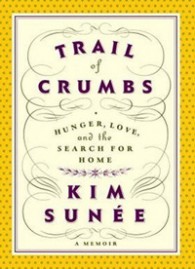This review contains affiliate links, which earn me a small commission when you click and purchase, at no extra cost to you. Thank you for supporting my small business and allowing me to continue providing you a reliable resource for clean book ratings.
On a park bench in a Korean marketplace, 3-year-old Kim Sunée was told by her mother to “wait right here.” Sunée did, and her mother never came back. After being adopted by an American family from New Orleans, she learns to love to cook and eventually makes her way to and around Europe, trying her hand at writing and attempting to figure out where her place is in a world that abandoned her at such a young age.
Ack, this book was a disappointment. Sunée felt like an emotionally unstable and unreliable narrator. I felt so frustrated with what seemed to be such a biased picture of her life. I recognize that a certain amount of bias comes with the territory when you’re reading a memoir, and yet, Kim gives such a self-absorbed portrait that I couldn’t help but wonder what she wasn’t telling me.
She hates her mother, feels completely rejected by her, and yet tells us virtually nothing of how it came to be that way. It’s almost as though Sunée feels like her adoptive family is somehow responsible for her abandonment: all the pain is rolled up together. She falls “in love” with many different men (one relationship is much more lasting than the others) and over and over seems to justify and blame her past for her inability to cope with the present.
Her time in Europe felt, on the one hand, full of flavors and life. She really does have a powerful writing voice and uses a vast palette of words (both English and French) to describe her experiences and culinary creations (all the French might drive some readers crazy, though). Despite the beauty of the food and the landscape, so many Europeans she encountered were petty and flighty — their relationships came and went; marriages meant nothing. It all just rather … depressed me, I think. And I know that I am not a particularly adventurous cook, but not one single recipe in this book appealed to me. If you love exotic and haute cuisine, this might be right up your alley, though.
Her “Korean-ness” is a theme throughout the book — what does it mean? Is it just a way to look? Is there something inside her she can find that will make her feel more like the way she looks? Readers who have been adopted from foreign countries might find familiar feelings in this memoir, especially those who can relate to her constant feelings of loss — that ever-present desire to search for the happiness that eludes her. For me, it just wasn’t a good fit.
Rated: Moderate. Some language and a couple paragraphs of a more graphic, sexual nature. Multiple mentions of implied and non-graphic sex.
Click here to purchase your copy of Trail of Crumbs on Amazon.




